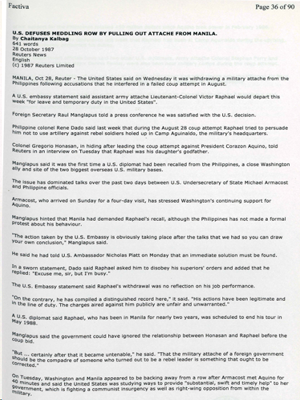U.S. DEFUSES MEDDLING ROW BY PULLING OUT ATTACHE FROM MANILA
[Reuters]
Published date: 28th Oct 1987
28 October 1987
Reuters News
English
(c) 1987 Reuters Limited
MANILA, Oct 28, Reuter – The United States said on Wednesday it was withdrawing a military attache from the Philippines following accusations that he interfered in a failed coup attempt in August.
A U.S. embassy statement said assistant army attache Lieutenant-Colonel Victor Raphael would depart this week “for leave and temporary duty in the United States”.
Foreign Secretary Raul Manglapus told a press conference he was satisfied with the U.S. decision.
Philippine colonel Rene Dado sald last week that during the August 28 coup attempt Raphael tried to persuade him not to use artillery against rebel soldiers holed up in Camp Aguinaldo, the military’s headquarters.
Colonel Gregorio Honasan, In hiding after leading the coup attempt against President Corazon Aquino, told Reuters In an interview on Tuesday that Raphael was his daughter’s godfather.
Manglapus said it was the first time a U.S. diplomat had been recalled from the Philippines, a close Washington ally and site of the two biggest overseas U.S. military bases.
The issue has dominated talks over the past two days between U.S. Undersecretary of State Michael Armacost and Philippine officials.
Armacost, who arrived on Sunday for a four-day visit, has stressed Washington’s continuing support for Aquino.
Manglapus hinted that Manila had demanded Raphael’s recall, although the Philippines has not made a formal protest about his behaviour.
“The action taken by the U.S. Embassy is obviously taking place after the talks that we had so you can draw your own conclusion,” Manglapus said.
He said he had told U.S. Ambassador Nicholas Platt on Monday that an immediate solution must be found.
In a sworn statement, Dado said Raphael asked him to disobey his superiors’ orders and added that he replied :”Excuse me, sir ,but I’m busy.”
The U.S. Embassy statement said Raphael’s withdrawal was no reflection on his job performance.
“On the contrary, he has compiled a distinguished record here,” it said. “His actions have been legitimate and in the line of duty. The charges aired against him publicly are unfair and unwarranted.”
A U.S. diplomat said Raphael, who has been in Manila for nearly two years, was scheduled to end his tour in May 1988.
Manglapus said the government could have ignored the relationship between Honasan and Raphael before the coup bid.
“But … certainly after that it became untenable,” he said. “That the military attache of a foreign government should be the compadre of someone who turned out to be a rebel leader is something that ought to be corrected.”
on Tuesday, Washington and Manila appeared to be backing away from a row after Armacost met Aquino for 40 minutes and said the United States was studying ways to provide “substantial, swift and timely help” to her government, which is fighting a communist Insurgency as well as right-wing opposition from within the military.
Armacost announced that Washington was transferring 75 million dollars to Manila in aid and added that U.S.
grant support for the Philippines totalled 450 million dollars since Aquino took power in February 1986.
Platt admitted at a press conference last week that Raphael had been at Camp Aguinaldo during the uprising, but said he merely performed his duties.
Foreign Department officials have said two other U.S. diplomats, Army Attache Colonel Stephen Perry and Assistant Army Attache Major Dennis Fowler, were also seen near military camps during the coup attempt.
They said Fowler’s bulletproof car was shot at by both government and rebel troops near the Villamor Air Base, also briefly occupied by rebels. The U.S. Embassy said it had no comment on the allegations.
“The two others have not been the subject of serious discussion as Colonel Raphael was,” Manglapus said.






